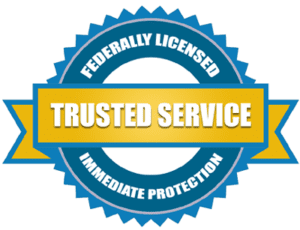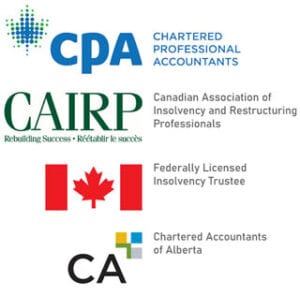Some of the most frequent credit questions clients ask of our Bankruptcy Trustees are, “How will my credit rating be affected by a bankruptcy?” “How long will a Bankruptcy stay on my credit report?” “How do I repair my credit report after bankruptcy?”
A person’s credit rating, or credit score, affects how willing creditors or banks are to extend credit or provide a loan to an individual. A poor credit rating limits one’s ability to get a loan or secure financing. When a creditor is willing to lend money to an individual with a lower credit score, the consequence of that is often a higher interest rate or extra fees.
THE FIRST STEP TO REPAIRING YOUR CREDIT IS TO GET YOUR BANKRUPTCY DISCHARGE ON TIME
Believe it or not, the first step to improving your credit after bankruptcy is to satisfactorily perform your duties while you are bankrupt and receive your discharge from bankruptcy in the prescribed timeframe. Creditors are aware of how long a bankruptcy should take. Individuals who do not complete their bankruptcy on a timely basis are looked upon as a significantly higher risk and it is our experience that these are the individuals who have the most difficulty securing financing after bankruptcy.
HOW LONG DOES IT TAKE TO GET YOUR CREDIT BACK AFTER A BANKRUPTCY?
There are a number of factors that impact a creditor’s assessment of credit worthiness, and their primary focus is the stability of a person’s lifestyle, the income a person earns, a person’s ability to live within a budget, and a demonstrated ability to save or make regular payments. Our credit rating page identifies the five major factors creditors consider before granting credit or extending financing. Most financial institutions have indicated that these factors are a critical component of every financing decision. After bankruptcy, individuals who want to improve their credit rating need to work toward and demonstrate these five factors.
People often say that they know they can’t get credit until “seven years after bankruptcy”. The fact is that there is no magic date when credit is restored. A bankruptcy stays on a person’s credit report for six years after they receive a discharge from their first bankruptcy, not seven. Although a Bankruptcy stays on your credit report for six years, this does not mean that you cannot get credit until six years has passed, nor does your credit magically improve after six years. Bankruptcy or no Bankruptcy, you have to build and earn your credit score.
We have countless examples of people who have gone bankrupt with us and are able to get financing shortly after getting their discharge. In each case, however, these people have satisfied the five factors identified on our credit rating page.
REPAIRING YOUR CREDIT IS A FUNCTION OF IMPROVING HOW ONE USES CREDIT, NOT ERASING BAD CREDIT
You can’t erase bad credit or eliminate or remove a bankruptcy from your credit report prior to the expiry of six years, but there are steps you can take to improve your credit history and make sure that it is accurate. Improving your credit rating will take some time, and it will not happen overnight.
PLEASE NOTE: There are many companies out there that claim they can erase bad credit, or improve your credit rating for a FEE. Be careful to avoid companies like this, as in 100% of the cases, these claims are false, and they represent nothing more than “Quick Fix Scams”, intended to stimulate you to part with your money.
Six Steps to Repairing Your Credit History
Step 1
In order to improve your credit report, you need to see what’s on it. In Canada, the credit reporting agencies must provide you with an opportunity to get a copy of your credit report free of charge, and they usually process a free request by mail. If you want to access your credit report on-line, there is usually a nominal charge. Please refer to our Credit Report Application page for details as to how you can obtain your free credit report or request a credit report online.[/one_half]
Step 2
Look over your credit report and identify any errors or negative comments. This review will identify what types of events negatively impact your credit, such as late payments, NSFcheques, missed payments, frequent requests for credit checks on your account, i.e. credit shopping where multiple creditors access your credit record to consider financing applications made by you.
Now that you know what types of events negatively impact your credit rating, you should take steps to avoid making those mistakes on a go-forward basis, and your credit score will eventually improve.
Our clients often report that a creditor has requested that they get rid of or cancel a few credit cards before they will consider granting a loan. As funny as that may sound, available credit, even if it is not used, can negate any opportunity to secure more.
Step 3
If you find any errors, you should contact the credit agency and provide proof of payment or evidence that you do not owe money. Evidence of payment might include copies of cancelled cheques, receipts evidencing payment, or even a letter from the creditor. The creditor can and should contact the Credit Agency if there is nothing owed and the record has not been updated.
If the creditor is not cooperative, you can forward a letter and have your comments added as a notation to your credit report.
Step 4
If there is a small amount owed or a debt that you have lost track of or that remains unpaid, contact the creditor, make arrangements to pay it, submitting the payment on the basis that they will report your full payment to the credit reporting agencies.
Step 5
Notwithstanding that you are making your minimum payments regularly, and on time, if a person has too many creditors or debts where the balances never seem to go down, creditors will be leery about granting more credit and worry that your list of creditors will be unmanageable. Fewer cards are better from a creditor’s perspective, and it is also easier for you to keep track of your payments, if you have less cards to deal with.
Avoid being tempted by the credit card pre-approvals you receive in the mail. The majority of people who end up in bankruptcy have indicated to our Bankruptcy Trustees that this is when their problems got started.
Step 6
If you find yourself falling deeper and deeper in debt, and having to “rob Peter to pay Paul”, and the hole you find yourself in is getting deeper each month, the first thing you need to do is stop digging and call for help. Avoiding the inevitable only serves to delay your recovery. Our professionals can help you quantify the extent of your problems and ascertain what options may be available to you.
If you have a stable job and money left over each month after you pay your living expenses (excluding your credit card minimum payments), there are a number of options available to you other than a bankruptcy.



